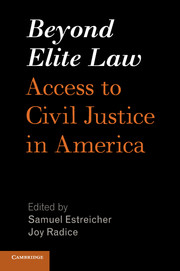Book contents
- Frontmatter
- Contents
- Beyond Elite Law
- Foreword
- List of Contributors
- Overview
- Overview
- PART I CURRENT STATE OF ACCESS TO LEGAL SERVICES
- 1 Access to Civil Justice in America: What Do We Know?
- 2 Life in the Law-Thick World: Legal Resources for Ordinary Americans
- 3 The Need for a National Civil Justice Survey of Incidence and Claiming Behavior
- 4 When Does Representation Matter?
- 5 Self-Representation and the Dismissal of Chapter 7 Bankruptcy Cases
- 6 Racial Disparities in Legal Representation for Employment Discrimination Plaintiffs
- 7 The Unemployment Action Center: A Student-Driven Response to a Legal Need
- 8 Immigrant Representation: Meeting an Urgent Need
- 9 Self-Representation, Civil Gideon, and Community Mobilization in Immigration Cases
- PART II SOURCES OF LEGAL SERVICES ASSISTANCE FOR WORKING AMERICANS
- PART III FASHIONING A REFORM AGENDA
- PART IV CREATING A CULTURE OF SERVICE
- Index
4 - When Does Representation Matter?
from PART I - CURRENT STATE OF ACCESS TO LEGAL SERVICES
Published online by Cambridge University Press: 05 May 2016
- Frontmatter
- Contents
- Beyond Elite Law
- Foreword
- List of Contributors
- Overview
- Overview
- PART I CURRENT STATE OF ACCESS TO LEGAL SERVICES
- 1 Access to Civil Justice in America: What Do We Know?
- 2 Life in the Law-Thick World: Legal Resources for Ordinary Americans
- 3 The Need for a National Civil Justice Survey of Incidence and Claiming Behavior
- 4 When Does Representation Matter?
- 5 Self-Representation and the Dismissal of Chapter 7 Bankruptcy Cases
- 6 Racial Disparities in Legal Representation for Employment Discrimination Plaintiffs
- 7 The Unemployment Action Center: A Student-Driven Response to a Legal Need
- 8 Immigrant Representation: Meeting an Urgent Need
- 9 Self-Representation, Civil Gideon, and Community Mobilization in Immigration Cases
- PART II SOURCES OF LEGAL SERVICES ASSISTANCE FOR WORKING AMERICANS
- PART III FASHIONING A REFORM AGENDA
- PART IV CREATING A CULTURE OF SERVICE
- Index
Summary
When does legal representation make a difference? Russell Engler reviews the existing research on the question and discusses the limitations of these studies. More work is needed, he concludes, to identify the factors that determine when lawyers make a difference; and greater receptivity should be shown for modes of assistance for the unrepresented that fall short of full representation by a licensed lawyer.
UNDERSTANDING THE QUESTION OF WHEN DOES REPRESENTATION MATTER
While a great deal of literature attempts to address the question of the importance of representation by lawyers in civil matters, the question framed that way masks the key Access to Justice concerns. Judges routinely report that they believe litigants are better off with lawyers, obtaining worse outcomes when they appear without counsel; many judges have further identified the burdens on the legal system that flow from the pro se litigants. As a result, guidance for judges often counsels judges to warn litigants of the perils of self-representation. Legal services lawyers staunchly believe that their clients are better off with representation. Opposing lawyers not only report that the absence of representation can have an adverse impact on the represented parties, but are generally prohibited by the ethical rules from giving advice to unrepresented parties, other than the advice to obtain counsel.
The most common reason that litigants appear without counsel in civil matters is that they cannot afford a lawyer. While the concept of “unbundled” legal services offers the promise of providing choice to clients to retain lawyers for only those tasks for which they needed a lawyer's expertise, the evolution of unbundling is two stories: a story about clients with resources, for whom choice might be a reality, and a story about clients with few to no resources for whom the choice is to receive unbundled help or no help at all.
In the Access to Justice context, therefore, the questions involving the importance of representation become more contextual than absolute. An inescapable reality embedded in the question is a scarcity of resources. Given that there are insufficient resources to provide full representation to all litigants in a given context, when should resources be allocated to full representation and when might lesser forms of assistance suffice? The reality of scarcity is essential in understanding the empirical work regarding representation.
- Type
- Chapter
- Information
- Beyond Elite LawAccess to Civil Justice in America, pp. 71 - 86Publisher: Cambridge University PressPrint publication year: 2016



